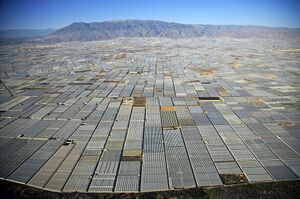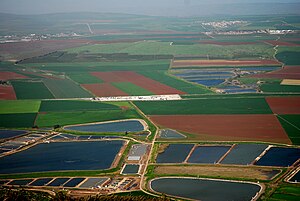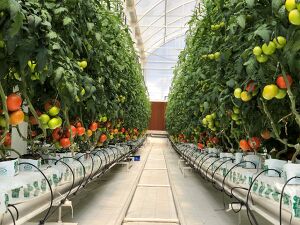Agriculture in Khyragus: Difference between revisions
| Line 75: | Line 75: | ||
==See Also== | ==See Also== | ||
[[Science and Technology in Khyragus#Agricultural technology| | * [[Science and Technology in Khyragus#Agricultural technology|Agricultural Technology in Khyragus]] | ||
{{Template:Khyragus NavBox}} | {{Template:Khyragus NavBox}} | ||
[[Category:Khyragus]] | [[Category:Khyragus]] | ||
Revision as of 18:25, 24 May 2021

Agriculture in Khyragus is a major and highly developed industry accounting for approximately 3% of the total GDP. Much of Khyragus is well suited for agricultural use. Khyragus is a net exporter of food and a leading developer of agricultural technology. The primary crops cultivated are rice, sugarcane, potatoes, and algae, however, Khyragus exports large quantities of tropical fruits, coffee. and tobacco.
History
Paragraph on ancient farming
Paragraph on middle ages farming
Revolutionary Farming
Farm Types
>>>Collective Farms
>>>Urban Farms
>>>House Gardens
Production
| Millions of Tonnes in | 2020 |
|---|---|
| Rice | 65.2 |
| Sugar cane | 47.8 |
| Potatoes | 32.5 |
| Microalgae | 24.1 |
| Maize | 15.3 |
| Citrus | 11.8 |
| Fruit (other) | 9.6 |
| Bananas | 4.1 |
| Vegetables (combined) | 3.3 |
| Oats | 3.1 |
| Chicken meat | 2.9 |
| Hen eggs | 1.4 |
| Quinoa | 0.8 |
| Legumes | 0.6 |
Major Agricultural Products
Food Crops

The primary grain crops cultivated in Khyragus are rice and maize which constitute Khyragus's main staple crops. Rice is generally grown in wetlands along the western side of the Okofil Mountains, where heavy rainfall and steady river flow provide plentiful water supplies. Golden rice and Basmati are the primary rice cultivars produced, however, several other varieties are grown. Maize is grown in the more arid plains region in the northeast of Khyragus. Maize is used for human consumption, as animal feed, and for the production of ethanol-based biofuels. Oats and quinoa are also grown in large quantities, along with wheat and barley.
About 12% of cultivated land is used to produce legumes. Peanuts are the largest legume crop by output and are an important source of food. Other legumes, such as lentils and black beans are grown throughout Khyragus.
Potatoes, tomatoes, cabbage, and onions are Khyragus's principal vegetable crops. The majority of these crops are grown intensively in hydroponic facilities in the western islands. Potatoes are grown in nearly every region of Khyragus, but the southeastern area produces the majority of potatoes produced.
Khyragus has historically been a major producer and exporter for a variety of fruits to other nations in Astyria. Bananas, along with various citrus fruits such as: Mandarin oranges, lemons, and limes are the most produced fruits. Citrus is mainly cultivated in irrigated groves along the western coasts of Khyragus and the southern regions. Khyragus has also established an international reputation for being a large supplier other tropical fruits, such as zelbolko, lychees, mangos and cacti fruit.

